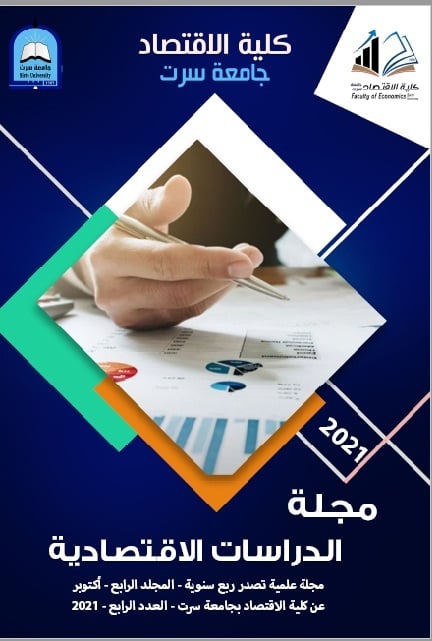Digital Transformation and Its Impact on the Development of the Libyan Business Sector: Reality and Prospects
DOI:
https://doi.org/10.37375/esj.v4i4.2268Keywords:
Digital Economy, Digital Transformation, Digital Maturity, Digital Inclusion, Operational ResilienceAbstract
Abstract
Throughout the ages, humanity has faced many pandemics and chronic diseases that cost lives and caused major crises with long-lasting effects and consequences. Today, the world is going through a state of confusion and instability at all levels. It is under pressure of a global pandemic with repercussions on, and underlying challenges in, various areas of life.
Furthermore, our era was marked by the Fourth Industrial Revolution, which mainly driven by technology. In fact, technology is being extensively used in all areas of life, as institutions and individuals increasingly relied heavily on it in performing their daily work, especially in the aftermath of the covid-19 pandemic. As most countries closed their borders and isolated themselves from the rest of the world to deal with the pandemic and prevent its spread, business experienced disruptions and, in some cases, were completely paralyzed, causing severe damage to the economic activity in both developed and developing countries alike.
Although the cause is the same, the consequences were not limited to the above but expanded also to other areas, such as, health complications, and social and psychological problems. In addition, there was a global economic recession that resulted in closure of businesses and their exit from the market; an increased unemployed; inability to pay; and financial confusion in the local and global markets.
Hence, it appears that a country’s technological capacity development will be one of the key factors to bet on in the future to deal with, and to curb, this pandemic in any country.
Libya, as a part of the global approach, is not an exception. This fact poses a real challenge for the business sector, which will inevitability need to adapt to the new realities. One way to do so is to reconsider its management methods by adopting those methods that rely on modern technology, not only in the hardware- such as technical equipments- but also in organization, management, and the exercise of the leadership process in various organizational aspects. The technology, before being a machine or a device, is an idea born of a need - as demonstrated by the Covid- 19 pandemic - or an interest. Thus, its adoption should be part of a comprehensive framework that covers all aspects of work.
Thus, this paper aims to shed light on the environment of the Libyan business sector and to describe the extent to which it employs technology in its business activities and extent of the impact to the Covid-19. A set of recommendations will be presented that will enhance the optimal use of technology in this vital sector in Libya.
References
المراجع-:
اولا-: المراجع العربية
.1 الإتحاد الإفريقي، )2019(، مشروع استراتيجية التحول الرقمي لأفريقيا (2020-2030) .www.au.int
.2 الأمم المتحدة، )2020(، مسح الحكومة الإلكترونية 2020- الحكومة الإلكترونية الرقمية في عقد العمل من أجل التنمية المستدامة مع ملحق استجابة فيروس كورونا (كوفيد)19-، إدارة الشؤون الاقتصادية والاجتماعية، نيويورك.
.3 الأمم المتحدة، )2017(، آفاق الاقتصاد الرقمي في المنطقة العربية، اللجنة الاقتصادية والاجتماعية لغربي آسيا السكوا، بيروت– لبنان.
.4 الأمم المتحدة، )2012(، إرشادات الإسكوا للتشريعات السيربانية لتحفيز مجتمع المعرفة في المنطقة العربية، اللجنة الاقتصادية والاجتماعية لغربي آسيا السكوا، بيروت – لبنان.
.5 البار، عدنان مصطفى، )2018(، تقنيات التحول الرقمي، كلية الحاسبات وتقنية المعلومات، جامعة امللك عبدالعزيز
.http://ambar.kau.edu.sa/,ambar@kau.edu.sa
.6 الجمعية المصرية لشباب الأعمال، )2020(، تحديات ومشاكل الاقتصاد الرقمي في مصر في مواجهة احتياجات شباب الأعمال المصرية، ملتقى التحول الرقمي وأهميته لشباب الأعمال، يونيو .2020
.7 الحاسي، عبدالله )2020(، دراسة تمهيدية عن الاقتصاد في ليبيا: الواقع والتحديات والآفاق، الجزء الأول من دراسة أولية
لمشروع الحوار الاجتماعي والاقتصادي الليبي، الأمم المتحدة – الإسكوا.
الشائبي، الصديق و بلق، عبدالله بشر )2020(، الآثار الاقتصادية لجائحة كورونا على بعض المتغيرات المالية والاقتصادية في ليبيا، ص ص 43-30، في العجيلي، خالد علي، مسعود، المبروك عبدالله محمد، عيسى، محمد محمود محمد، محاضرات
ومداخلات وأبحاث مؤتمر جائحة كورونا الواقع والمستقبل الاقتصادي والسياسي لدول حوض المتوسط، المنعقد في 05-04 نوفمبر 2020م، جامعة صبراتة، مركز البحوث والاستشارات والتدريب بالتعاون مع كلية الاقتصاد والعلوم السياسية وكلية الموارد البشرية.
. المصدر، هيثم إبراهيم، ونصرالله، عبدالفتاح أمحد )2020(، دور التحول الرقمي في تحسين الخدمات الحكومية في فلسطين، المؤتمر الدولي الأول في تكنولوجيا المعلومات والأعمال.
. الهيئة العامة للمعلومات، )2015(، التقرير التأسيسي، مشروع دليل المؤشرات الوطنية، المرحلة الأولى، يونيو.
. العبلاني، سلام أحمد )2018(، وعود الثورة الصناعية الرابعة، جملة التقدم العلمي، العدد 023، مؤسسة الكويت للتقدم العلمي، الصفحة .3
. أمني، مصطفى أحمد، 2018(، التحول الرقمي في الجامعات المصرية كمتطلب لتحقيق مجتمع المعرفة، جملة الإدارة التربوية، العدد 01، كلية التربية –جامعة دمنهور – مصر.
ثانيا -: المراجع الأجنبية:
Aquaro, V. (2020), E-Government Survey: Global and Regional Trends and Insights. Global Launch of E-Government Survey 2020, United Nations, Department of Economic and Social Affairs – New York, July.
Boehm, J. and Smith, J. (2021), Derisking Digital and Analytics Transformation, McKinsey Global Institute,
January.
Bonnet, D. and Westerman, G. (2021), The New Elements of Digital Transformation, MIT Sloan Management Review. Winter issue, V. 62, N. 2 :82-89.
Deloitte (2015), The Journey to Government’s Digital Transformation, Deloitte University Press.
Katz, R. L. (2017), Social and Economic Impact of Digital Transformation on the Economy, ITU/BDT Regulatory and Market Environment Division, https://www.itu.int/en/ITU- D/Conferences/GSR/Documents/GSR2017/Soc_Eco_impact_Digital_transformation_finalGSR.pdf
Kumar, R., Sachan , A., Mukherjee, A., Kumar, R. (2018), "Factors influencing e-government adoption in India: a qualitative approach", Digital Policy, Regulation and Governance, https://doi.org/10.1108/DPRG-
-2018-0007. , https://www.researchgate.net/publication/326996581
Leonardi, P. (2020), You’re Going Digital – Now What?, MIT Sloan Management Review. Winter issue, V. 61, N. 2 :26-35.
Maderspacher, Q., McCarthy, M., Scherf, G. and Stern, S. (2021), Ahead in the Cloud: Transforming Public- Sector Performance. McKinsey Global Institute, February.
Westerman, G., Bonnet, D. and McAFEE, A. (2014), Leading Digital: Turning Technology into Business
Transformation, Harvard Business Review Press: Boston, Massachusetts.
ثالثا-: التشريعات
.0 قرار مجلس الوزراء رقم )74( لسنة 2012 في شأن إنشاء مكتب للحكومة الإلكترونية. ◻
.0 قرار مجلس الوزراء رقم )313( لسنة 2012 في شأن إنشاء مشروع شبكة ليبيا للتجارة.
.3 قرار مجلس الوزراء رقم )663( لسنة 2013في شأن إنشاء مركز الامتياز للحوكمة والخدمات الإلكترونية. ◻
.4 مسودة مشروع قانون المعاملات الإلكترونية الليبي .)0203(
رابعاً-: مواقع على الإنترنت
.2 موقع الهيئة العامة للمعلومات : .https://www.gia.gov.ly/ar/news/1225
.1 موقع النصوص القانونية المتعلقة بالقطاع الأمني في ليبيا: .https://security-legislation.ly/ar/node/32080
.3 موقع الهيئة العامة للاتصالات والمعلوماتية: .http://cim.gov.ly/index.htm
.4 موقع ديوان رئاسة الوزراء: .http://backup.pm.gov.ly/
.5 موقع شبكة ليبيا للتجارة: .http://www.ltnet.ly/ltnet
.6 موقع مشروع سلسلة أطلس ليبيا للمعلومات القطاعية .https://www.gia.gov.ly/ar/48
.7 موقع مصرف ليبيا المركزي .https://cbl.gov.ly/
https://publicadministration.un.org/egovkb/en-us/Data/Country-Information/id/97- الإلكترونية
موقع مؤشر المشاركة
.Libya




































